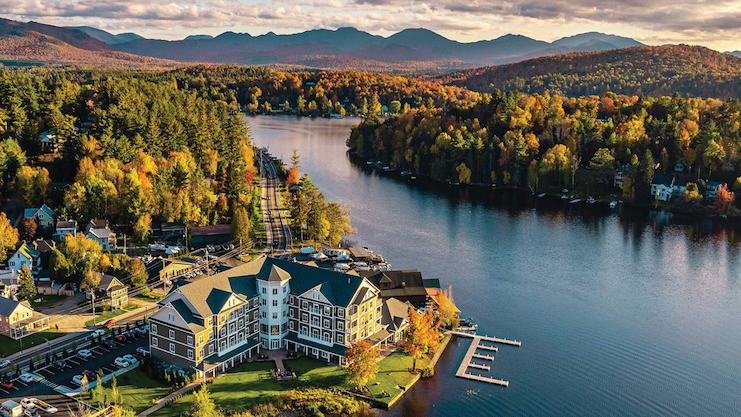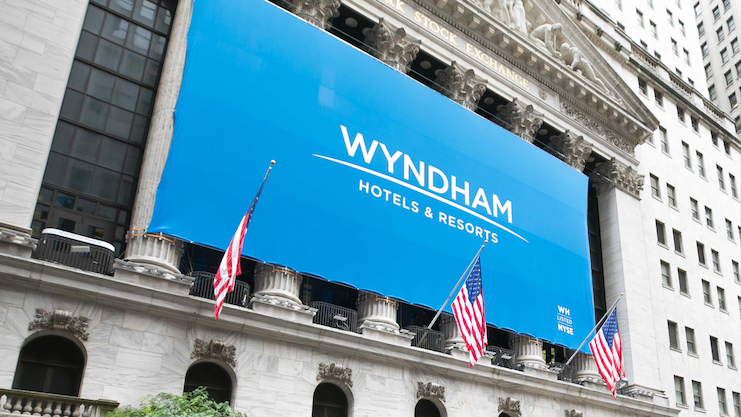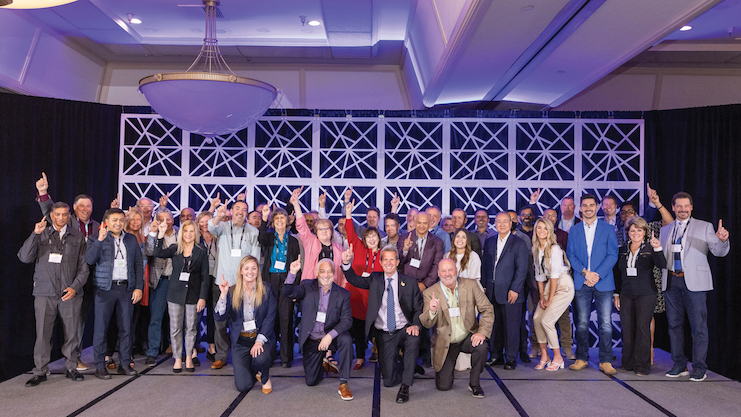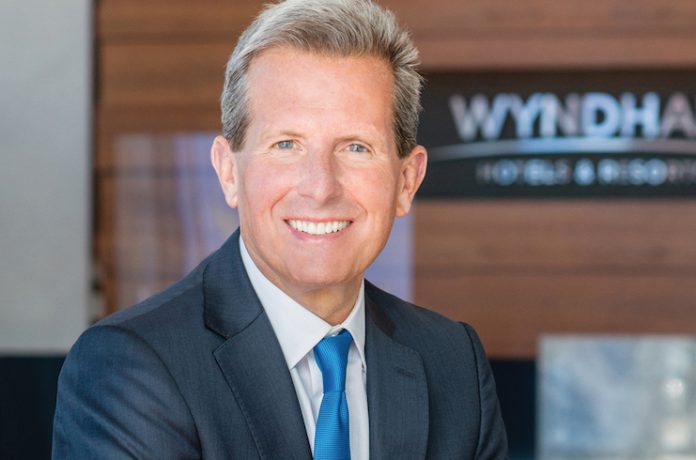As I sit down with President & CEO Geoff Ballotti to talk all things Wyndham, we’re perched high above the 18th green at the Wyndham Championship in Greensboro, North Carolina. As we discuss everything from its milestone of five years as a public company to new brand launches, the conversation is occasionally put on hold by a loud cheer or gasp from the crowd, depending on whether the putt is made or missed.
But regardless of the results on the course, Ballotti “drove” home the point that Wyndham Hotels & Resorts has clearly put itself on the hospitality leaderboard and effectively elevated its brand image for years to come on the strength of a robust pipeline and exceptional brand retention.
Ballotti touted the Parsippany, New Jersey-based hotel company’s performance as he reflected on the past several years and explained why he believes Wyndham’s stock is going in the right direction.
Now armed with 24 brands, Wyndham Hotels & Resorts—which was spun off as a subsidiary of publicly traded Cendant Corporation in 2006 as Wyndham Worldwide Corporation before its subsequent 2018 IPO—now has more than 9,100 hotels open globally with a pipeline of some 1,850 properties. “They’re seeing the results of our net unit growth and our pipeline growth. It’s been 12 consecutive quarters of growth in our development pipeline. Everything we set out to do in terms of our growth algorithm has been consistently happening over the last 12 quarters. That is something that I think Wall Street is very excited about,” said Ballotti, adding that 11 out of 12 analysts covering the company’s stock are currently recommending it to consumers.
Ballotti also maintained that the fact the company has grown its brand lineup largely from within in recent years is a plus among the investment community. “If you think about the last number of brand launches we’ve had, they’ve been organic; we haven’t had to go out and buy [a brand],” he said.
The last brand acquisition for the company was its purchase of La Quinta, which was some five years ago and within weeks of its 2018 IPO. However, within the past few years the company launched its Wyndham Alltra brand for the all-inclusive market and its Registry Collection Hotels for the luxury tier. Last March, Wyndham debuted its 24th brand with the addition of ECHO Suites Extended Stay by Wyndham, an economy, extended-stay brand (see sidebar). Ballotti elaborated on why that type of growth is significant. “Wall Street wants to see organic unit growth. We could easily go out and acquire more brands, but would that help our net unit growth? We’ve seen plenty of competitors that have acquired a brand and it might be a short-term boost, but investors are focused on the long term.”
And while continuing to expand its brand portfolio would obviously help boost net unit growth, Ballotti explained there are many other considerations when growing its brand family.
“We’ll continue to add new brands where they make sense, but really there’s no segment of the industry today where we do not have a brand represented. One of the things we’re very careful about is being very thoughtful when we add a brand from an overall franchisee engagement and retention standpoint. How are other franchisees in that segment going to feel about that brand addition?” he noted.
Ballotti, meanwhile, stressed that Wyndham is laser-focused on small-business owner engagement. He pointed out that its franchisee retention rate is a critical metric for the company, a number which reached 95 percent in 2022, according to STR.
“The acid test ratio of how engaged any owner is shows up every year in the retention rates that we publicly report. In the economy segment, nobody has a higher publicly reported economy retention rate than Wyndham Hotels & Resorts. It’s 300-400 basis points higher than the segment,” he said, adding that the retention rate is particularly significant given the thousands of economy properties that Wyndham has in its portfolio.
But the company continues to increase its presence in other segments as well. For example, its upper-midscale Trademark Collection—which was launched roughly six years ago—has some 185 hotels open and should surpass the 200-hotel mark early next year following its recently announced deal with LuxUrban Hotels, Inc. for another 16 hotels and 1,400 rooms.
Located in major urban markets such as New York, Los Angeles, Miami, Washington, and New Orleans, the hotels will maintain their LuxUrban branding while also gaining affiliation and recognition via the Trademark brand name, according to the company.
Chip Ohlsson, chief development officer, Wyndham Hotels & Resorts, talked about how the recent deal with LuxUrban came to fruition. “They were seeking a partner, so we met with them and they really liked the way we do business with our owner-first mentality. We couldn’t be happier to be in these high RevPAR urban markets,” said Ohlsson.
Another avenue of considerable growth for the company has been international markets. Over the course of the last five years, Wyndham has expanded its global pipeline by over 50 percent to 226,000 rooms—80 percent of which is now new construction—and its direct franchising pipeline in China by nearly 70 percent.
Ballotti reinforced the company’s continued commitment to global expansion with 9 percent growth last quarter and also touted the company’s global personnel.
“It will continue to be a very important piece of our growth algorithm. As the world’s largest hotel franchising company, it’s important to have the best franchise sales teams and the best leadership teams on the ground that are actually selling our 24 brands,” said Ballotti.
Wyndham has also recognized the importance of diversity when it comes to hotel ownership with the creation of a couple of key initiatives. Its Women Own the Room and BOLD by Wyndham programs are geared toward increasing women and black hotel ownership, respectively. The new programs have resulted in roughly 50 combined signings and more than a dozen hotel openings.
Lisa Checchio, EVP, chief marketing officer, pointed out the discrepancies that exist in the industry, noting that while women make up some 70 percent of the workforce in the industry, they own less than 10 percent of hotels. “We feel we have an obligation to ensure that just as we make hotel travel possible for people, we want to make hotel ownership possible too. The way that we’re able to do that is by using our scale to help to overcome the barriers that these underrepresented groups face,” she said.
Meanwhile, Ballotti highlighted the importance of marketing the company’s brands as “by Wyndham” to help tie them into the company’s loyalty program. Wyndham Rewards has grown to include more than 100 million enrolled members. In addition, nearly half of all U.S. check-ins within the Wyndham system are from program members who, on average, stay nearly twice as long and spend nearly twice as much, according to the company.
“Our owners have all embraced the power of Wyndham Rewards, knowing ‘if I could receive half of my bookings from a loyalty program as opposed to through an online third-party travel agency, I’ll sign up for that,’” he said. Finally, Ballotti discussed how the company culture has evolved and how events like the Wyndham Championship have helped tee up the company for further growth.
“We’re all guided by something called the Wyndham compass, which was launched right in the middle of COVID. It ensures every one of our 2,000 team members is thinking every day about what my job is doing to improve that owner value proposition. What is it that I can do as a team member to make sure that our franchisees know us better, like us better, trust us better, and are more likely to stay with us? It’s the image of Wyndham that has just come so far, we need to continue to elevate that brand as we continue to grow,” he said.
ECHO Suites: A Developing Situation
Having identified opportunity and white space in the economy extended-stay segment, Wyndham Hotels & Resorts last March launched its ECHO Suites brand, and the company hasn’t looked back as it has quickly become one of its hottest brands among developers.
After breaking ground on its first three hotels late last year, the nascent brand has some 265 hotels in development with the first ECHO Suites Extended Stay by Wyndham expected to open later this year. In late July, the company signed a development deal for an additional 60 hotels, including the brand’s first properties in Canada.
Acknowledging the fact that a number of branded competitors have recently entered the same space, Wyndham Hotels & Resorts President and CEO Geoff Ballotti stressed that a major differentiator for ECHO Suites is that “it’s the only all new-construction brand in the segment.”
One of the driving forces for the creation of the brand was the historic 2021 Infrastructure and Jobs Act signed into law by President Biden, which includes $1.2 trillion in approved funding. Ballotti noted the new brand checks many of the boxes for companies involved in such projects.
“They want something new, check, this is all-new construction. They want something affordable, check. They want something clean and well maintained, check and check. They want something where their business travelers are going to be happy,” he said.
Lisa Checchio, EVP and chief marketing officer, referred to ECHO Suites as the “fastest-growing brand in the segment.” She continued, “The momentum and excitement for the brand now 18 months after being launched still continues to grow. The pipeline continues to grow; the hotels are coming out of the ground one behind another.”
Chip Ohlsson, chief development officer, detailed the company’s approach to growing the brand.
“We’ve been very, very strict on who we partner with from a development perspective. We’re looking at only operators who’ve operated in this space before and developers who have developed in this space before and know what they’re doing,” he said.
Ohlsson elaborated, “They [owners] feel that there’s integrity in this brand, that it is a brand that they can build their whole portfolio around because of how strict we’ve been. They know that the first one that opens is going to look like the 50th that opens and the 200th that opens, and they’ll be operated all in the same manner. … It’s a true extended-stay brand.”
Finally, when asked about the possibility of further brand extension within the segment to complement ECHO, as well as its Hawthorn Suites by Wyndham extended-stay brand, Ballotti didn’t rule it out.
“The extended-stay space is so under-penetrated. The demand from every study I’ve read, and every study our developers have read, is infinitely higher than there is extended-stay space. We do not have an economy, extended-stay conversion brand. If there was something out there that made sense, would we look at it? Absolutely,” he concluded.
Late last year, the brand broke ground on its first three hotels, and nearly two dozen more ground breakings are expected for this year. The first ECHO Suites hotel is on track to open by end of this year with additional hotels in 2024.















Think of your trading strategy as a ship, and your facility finances as the anchor that keeps it steady. Without a solid financial foundation, your ship might get tossed around by market storms. So, how do you build this foundation? Well, first, you need to understand the basics. Calculating lot sizes in Forex is like setting the sail on your trading ship. It determines how far you’ll go and how much risk you’re willing to take. If you’re not sure how to do it, check out this link for a handy guide here https://www.litefinance.org/blog/for-beginners/how-to-calculate-a-lot-on-forex/.